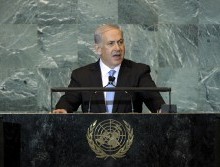With a self-imposed goal of March 24 for the major world powers to reach a nuclear deal with Iran just weeks away, Israeli Prime Minister Benjamin Netanyahu laid out his goal for what a deal would look like. “The right agreement is one that extends by years Iran’s breakout time to achieve a bomb, given the feasibility of violating the agreement,” said Netanyahu in comments released by his office.
This runs in contrast to the United States’ minimum goal of one year for a breakout—the term used to describe Iran’s capacity to “break out” of an inspections regime and develop nuclear weapons. Netanyahu confirmed that the current deal being discussed will achieve that one-year breakout time or less, based on Israeli “intelligence elements.” But as he pointed out in a separate interview with CBS’ Face the Nation, he doesn’t trust Iran and so one-year is not enough.
“I do not trust inspections with totalitarian regimes. It didn’t work with North Korea, they violated it and played a good game of hide and cheat,” said Netanyahu in comments posted to the CBS website. He pointed out that Iran itself has already “cheated” inspectors and hid underground bunkers from inspectors and intelligence agencies.
That means that the timeframe for how long a cheating Iran could need to develop a bomb needs to be “several years,” said the Israeli leader. “In a year anything could happen, you could have international crisis, they could get away with it,” said Netanyahu of a one-year timeframe for a breakout to a bomb.
In addition to crafting a deal with a longer breakout time, Netanyahu said a good deal should “contract Iran’s nuclear program” and he insisted that restrictions on Iran’s nuclear program not be lifted until Iran’s support for terrorism and threats against destroying Israel end, rather than linking the lifting of restrictions to a timeframe like 10 years.
He said such a deal is one that Israel could “literally live with.”
While the ticking down time frame makes it appear that a deal could be imminent, Netanyahu told Israel’s cabinet in the comments from his office that he is hopeful that some are willing to wait for a better deal.
“Following my speech to Congress, we heard—over the weekend—several of the major powers’ foreign ministers saying that they do not see the need to reach an agreement forthwith and that they will wait until the right agreement is found. I hope that these words will find tangible expression.”
(By Joshua Spurlock, www.themideastupdate.com, March 8, 2015)

